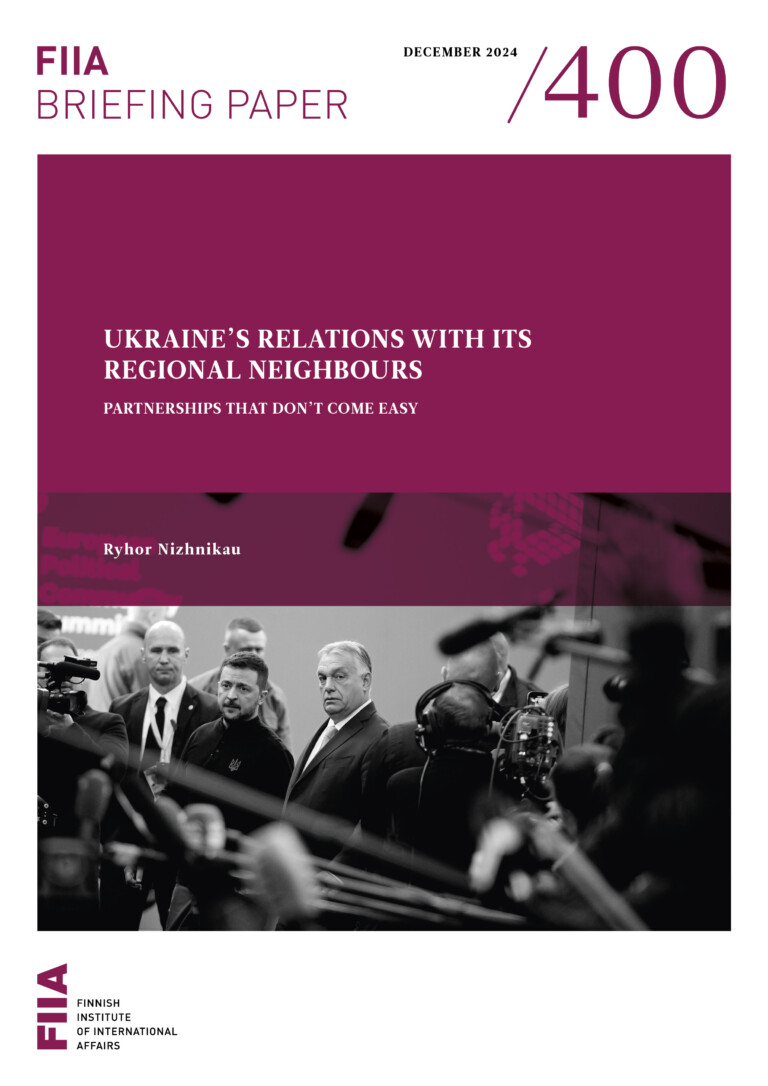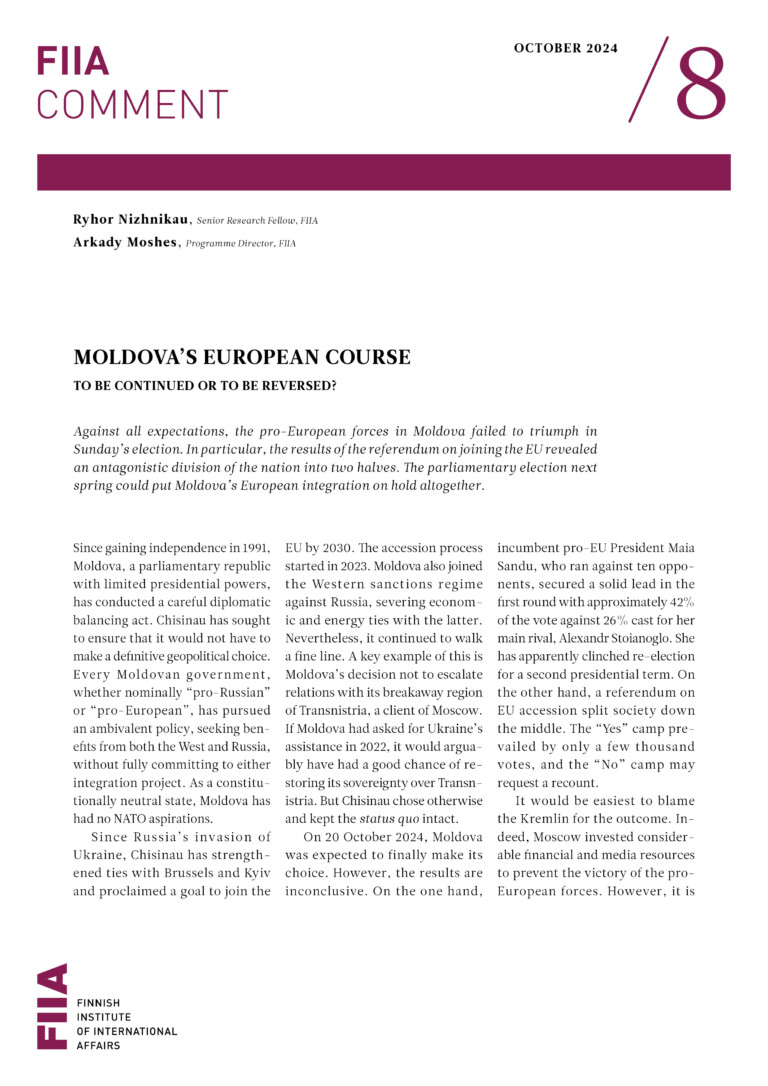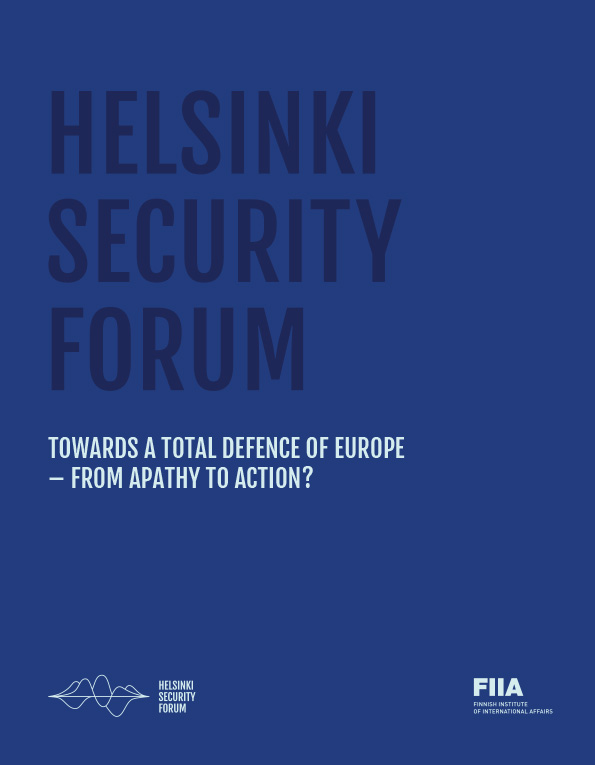The pillars of social and political stability are eroding in Belarus, and the economy is deteriorating rapidly. In view of the limited budget resources, absence of large-scale foreign investments and decrease in Russian subsidies, there is little prospect of maintaining the old social contract, as revealed by the popular protests in spring 2017.
Russia is advancing its interests in Belarus, while Minsk’s freedom of manoeuvre is narrowing. Moscow is intent upon the deepening integration of Belarus into the Russia-centred system of economic and security alliances, and is able to exploit pro-Russian sympathies among the population. The Belarusian authorities recognize the challenges, but time after time choose the old methods of dealing with them. They refuse to undertake economic reforms and use repressions of scale.
The resumed interaction between Belarus and the West is driven by geopolitical considerations as well as Minsk’s desire to find new sources of economic assistance. But its fear of a ”Western conspiracy” aimed at bringing about political liberalization and an eventual regime change continues to undermine trust in the relationship. Western actors, the EU in particular, should engage with Belarus only on conditions that promote the transformation of both the regime and society, even if slowly. The failure to do so, and the country’s failure to transform, may lead to the emergence of a serious crisis situation at Europe’s borders.
Introduction: Fundamentals of the Lukashenko model
For more than 20 years, President Alexander Lukashenko has maintained a monopoly on power in Belarus. He built a personalistic authoritarian regime, having consolidated unprecedented executive and legislative authority. To this end, the parliament and the judiciary have been subordinated. Not only status and well-being, but the very personal freedom of top representatives of the country’s political and economic elites depend on their leader’s will. Independent civil society and the media are weak and constantly oppressed.1
Yet the regime’s sustainability has primarily derived not from coercion and repression, but from relatively high popular support, which grew out of a distinct socio-economic model. This model of a “socially-oriented market economy” distributed basic socio-economic benefits across society. The regime’s tight grip on and administrative interference in the economy, as well as pressure exerted on private business, provided the authorities with significant resources. An archaic public sector absorbed the labour force. The absence of large-scale privatization prevented the emergence of oligarchic structures, unlike in neighbouring Russia and Ukraine, and in its own way strengthened the self-perception of Belarus as a more “just” country, which was important for the population. All this, however, would not have sufficed without colossal Russian support that reached, according to IMF estimates, $100 billion in 2005–2015 alone. In exchange for the guaranteed minimum, the Belarusian “social contract” implied that society would not engage in politics.
The combination of repressions, especially tough after the presidential elections of 2006 and 2010, the co-optation of certain public figures, as well as the appeal of the existing model to the majority of the population, resulted in the fragmentation and marginalization of the opposition.2 Individuals and organizations propagating liberal, leftist or national-democratic views exist, but they have no real electoral perspective and cannot constitute a nationwide alternative to the regime. Parties have only hundreds (or in some cases merely dozens) of active members.3
Good relations with the West have not been essential for the functioning of the system. It is no accident that Belarus is the only Eastern Partnership country that has never concluded any framework agreement with the EU. The relationship has been cyclical, with the West tightening and relaxing its approach depending on the actual level of repressions. As long as Minsk could obtain from Moscow what it needed economically, while keeping a certain political distance from it, Belarus could withstand Western pressure rather easily. In 2015, in the context of the Western-Russian conflict over Ukraine, Belarus and the EU started a new round of rapprochement.4 However, thus far it has been limited to diplomatic contacts and minor technical assistance projects,5 and has in no way affected the fundamentals of the regime’s behaviour.
Still, questions arise with regard to how long the system can exist in its current shape. Is Belarus an “island of stability”, as it has often been portrayed, or could latent conflicts erupt? If so, will the regime consider economic and political reforms an option? Finally, what is the interplay between the changing domestic environment and the dynamics of Belarus-Russia relations? Answers to these questions should be of primary policy relevance.
Economic problems and social protests
The Belarusian economy is experiencing its third recession since 2009. In 2012, 2013 and 2014 GDP grew by a mere 1.7%, 1%, and 1.6%, respectively; it fell by 3.9% in 2015 and by 2.7% in 2016. The World Bank and the IMF forecast a GDP decrease of between 0.5 and 1% in 2017. The potential for growth in 2018–2021 is estimated by the IMF as marginal – between 1 and 1.75%. The June 2016 IMF report concludes that “macroeconomic and financial conditions remain fragile, with elevated vulnerabilities, and eroded policy buffers”.
These economic troubles are sometimes explained by a decrease in Russian energy subsidies, a fall in the prices of oil products and potassium, which are the country’s main export commodities, and the shrinking of the Russian market. However, arguably, the primary roots of the problems are domestic. It is the structural weakness and inefficiency of the unreformed Belarusian economy that constitutes the key economic vulnerability.
In short, as a residually socialist economy, with its five-year plans and price controls, Belarus has suffered from quantity drive, paternalism and soft budget constraints. Forced growth, the hidden factual unemployment of formally employed people, low productivity, an inept public sector and weak financial institutions are its typical features.6
The Belarusian economy is run by the president himself and his administration, and is coordinated by a Soviet-like bureaucratic machine. As Lukashenko noted in June 2015, the ministries and state concerns directly administered 1005 enterprises – almost half of the national economic assets. Even some basic managerial decisions at the local level or in state-owned enterprises require approval. Presidential decrees may contain very specific directives. For instance, a decree adopted in 2012 prohibited employees from resigning from the wood-processing industry without special permission. State ownership dominates and property rights are largely fictional. Top businesspeople are routinely arrested and deprived of their assets.7
The economy no longer allows for the maintenance of Soviet-style social protection and full employment. Although the governmental statistics operate with a 1% unemployment rate, the National Statistical Committee Belstat household survey admitted 5.8% unemployment in 2016. Furthermore, the request to pay the so-called “social parasite” tax of approximately 190 USD (a large sum of money in a country with an average official salary of 350 USD, and leviable upon people without official employment) directly affected approximately 10% of the working-age population. Factual part-time employment, when employees work a few days a week or are forced to take unpaid leave, has to be taken into account as well.
By the end of 2016, real wages had decreased substantially compared to 2014. At Belaruskaliy, the national champion and the world’s leading potassium exporter, salaries were reportedly halved in 2017. Two-thirds of new vacancies in the Brest region currently offer a monthly salary of less than 200 USD. Officially, real incomes fell by 7.3% in 2016 alone. Since 2017, Belstat has stopped publishing data on the median income level, which is a serious indicator of the existing problems. Utility tariffs for 2017, on the other hand, were increased by 15% on average. As a result, individual currency deposits and savings, once the largest per capita in the CIS, decreased by one-third during 2016.8
A wave of popular protests in February–March 2017 against the tax on “social parasites” and, indirectly, against the state’s inability to provide jobs and benefits as expected in accordance with the social contract, took the authorities by surprise. Accustomed to dealing with liberal protests against unfair elections or limitations on political liberties, the regime did not know how to tackle the paternalistic demands of its core constituency.
The protests were characterized by unprecedented proliferation, which is understandable as employment opportunities in the provinces are worse than in the capital, repeated participation by protesters, and personal sentiments and statements against Alexander Lukashenko. The internet and social networks gave the process a new quality in terms of public attention.
The protests started on February 17 in Minsk, when 2,000 people took to the streets. On February 19, hundreds protested in the regional capitals of Mogilev, Vitebsk and Brest, and almost 2,000 gathered in Gomel. A week later, the demonstrations continued in Brest, Baranovichi, Bobruysk, Orsha and Vitebsk. On March 15, 2,000 demonstrators gathered in Minsk and hundreds in the regions. Overall, between March 5 and 19, protests of various sizes occurred in at least 12 towns. Ultimately, on March 25, protests in Minsk were dispersed by the police. Attempts to arrange another protest march in Minsk on May 1 were not authorized and were largely unsuccessful.
This demonstrated that the regime was still in control of the situation. However, it also has to be noted that on March 9 the authorities announced a major concession, namely the suspension of the introduction of the “social parasites” tax for one year.
A gamble with Moscow: Minsk’s cards are weakening
The Russian policy towards Belarus has long been known as “gas for kisses”. In a nutshell, it could be described as an exchange of massive subsidies for Belarus’s active participation in economic and security integration around Moscow. The Kremlin has not always been happy with the degree of loyalty and commitment demonstrated by Minsk. Several times (2004, 2007, 2009–10), Russia tried to “discipline” its ally by restricting the subsidies and engaging in public criticism of Belarus. However, Minsk was by and large able to withstand the pressure and obtain acceptable compromises. Of course, Minsk was rarely in a position to resolutely reject Russian proposals altogether, but it could significantly delay the conclusion of agreements or avoid their full implementation.
One key explanation as to why this was the case was Lukashenko’s ability to raise support within some quarters of the Russian elites and Russian society at large (the latter thanks to the appraisal of the Belarusian egalitarian post-socialist model within Russia itself), and to monopolize the channels of interaction with Moscow inside Belarus.
The situation changed after the outbreak of the crisis over Ukraine. The Kremlin’s financial resources shrank, and it simply had no other option but to cut Minsk’s benefits. At the same time, Moscow can tolerate less disobedience than it did before since, if it does allow the flirtation between its closest ally and the West or Belarus’s selective approach towards Eurasian integration initiatives, the whole claim that Russia is an attractive pole of gravity will be in jeopardy. Vladimir Putin’s domestic legitimacy currently rests largely on Russia’s ability to assert and impose the official Russian vision of what is right upon its partners, not on keeping them happy. In other words, domestically, Putin can afford – or even gain from – a diplomatic quarrel with Belarus to a much larger degree than before.
In addition to traditional economic leverages, Moscow rebuilt its capability to exploit the cultural and political preferences of large parts of Belarusian society, which identify themselves as a part of the so-called “russkiy mir” (“Russian world”), by putting pressure on Lukashenko. In late 2016, surveys revealed that 74% of respondents considered themselves close to Russians, 71% named Russian as their main language, and 65% approved of the alliance with Moscow.9 In the event that these people are convinced by the Russian media, which have a strong presence in Belarus, that living standards are decreasing because Minsk is turning away from Moscow towards Europe or becoming “nationalist”, Lukashenko’s domestic position will be much more vulnerable.
In order to understand the extent to which Russia’s grip over Belarus has strengthened in recent years, it would be useful to compare the Belarus-Russia deals reached, respectively, in December 2010/November 2011 and April 2017. Both were preceded by economic and diplomatic conflicts, in which Minsk’s rapprochement with the West played a noticeable role as an irritant for Moscow. In both cases, Belarus sought to increase the subsidies, while the Kremlin endeavoured to make sure that Minsk would fulfill its earlier promises. In 2016, the latter went as far as to refuse to pay the contract price of Russian gas, which led to the quick accumulation of debt, and unilaterally raised the oil transit fees. Moscow retaliated, among other things, by cutting oil deliveries and duly depriving Belarus of significant export revenue, and by reinstituting border controls in order to stop the re-export of goods into Russia through Belarusian territory.
In 2010–2011, Minsk’s strategy worked. Moscow finally offered lavish new subsidies in exchange for the sale of the remaining stake in Beltransgaz, the Belarusian pipeline network, and the promise to join the Eurasian Customs Union. The gas price for 2012–14 was decreased by 40% (!) – from $263 to $165 per 1000 m³. Added to this, Moscow provided a $3 billion loan from the Eurasian Economic Community’s Stabilization Fund and a $10 billion loan to build a nuclear plant in Belarus.
In 2017, the situation is quite different. The loan provided by the Russian government only slightly exceeded the $741 million gas debt that Belarus had to pay back; de facto, Moscow just made sure that Gazprom would be paid for its services. The discount on gas was marginal: the price was lowered from a preliminarily calculated $150 to $129 and $127 per 1000 m3 respectively for 2018 and 2019, compared with $132 paid in 2016. Importantly, Moscow postponed the signing of a new gas contract until 2020. Oil supplies were restored, but there will be no retroactive compensation for the losses incurred. Minsk also signed the Customs Code of the Eurasian Economic Union, which it had previously considered to be against the country’s interests and, consequently, had refused to sign in December 2016. There is also speculation about whether Belarus had to undertake new obligations regarding security cooperation, which is in any case on the rise as attested by the large-scale “West-2017” joint exercises, planned to take place in September. The border controls have remained in place and even been strengthened with regard to travellers from Belarus arriving at Russia’s airports. A new round of the “milk war”, namely restrictive measures concerning Belarusian dairy exports to Russia, broke out just last May. All in all, the 2017 deal appears to be a temporary and partial compromise, with an inbuilt element of conditionality. Pressure may quickly build up again, if Minsk demonstrates a lack of compliance.
The government’s response: a circular movement
It would be incorrect to claim that the Belarusian regime is in complete denial about the challenges it faces. In 2014–17, there have been some attempts to introduce changes in the government’s policy. On each occasion, the regime has been unable to break the vicious circle, however. One plausible explanation could be that President Lukashenko simply refuses to see problems as domestically-rooted and structural, and rather views them as being the result of external pressure or conspiracies. Another explanation is that the authorities instinctively tend to rely on mechanisms that served them well for almost a quarter of a century. In any case, “business as usual” manifests itself in at least four areas.
First, the system tested the possibilities for strengthening – or eventually substituting – the ailing social contract with what some experts called a “security contract”10 that would be built upon the president’s assumed role as the constitutional guarantor of Belarusian independence and sovereignty. In 2014, Lukashenko tasked his “vertical” with generating the “national idea” and, in more practical terms, tried to bridge the gap with the national-oriented segments of the population, particularly by promoting the use of the Belarusian language. Symbolically, a representative of the “Community of the Belarusian language”, Elena Anisim, became the only civil society activist to enter the Belarusian parliament during the 2016 elections. In December 2016, three Belarusian bloggers, writing on the “Russian world” platform and criticizing Lukashenko for “Belarusization” were arrested, which was universally perceived as a signal to the same audience that the times were changing.
However, in early 2017, Lukashenko himself admitted that his call to develop a viable conceptual foundation for the new national idea had not succeeded. Furthermore, a brief engagement with the cultural elites lost its meaning when, during the spring 2017 protest wave, the latter were labelled the “fifth column” and even repressed, like former presidential candidate and national poet Vladimir Nekliayev. Displaying the white-red-white first national flag of independent Belarus, which in the mid-1990s was replaced with a red-green Soviet-style flag by Lukashenko but which remains a uniting symbol for all national groupings in the country, regularly causes problems for individual activists.
Second, although some senior officials publicly admit that institutional and structural reforms are necessary for the economy, the president himself remains extremely reluctant, apart from agreeing to tighten the fiscal discipline. In June 2015, underlining the achievements of the five-year plan, Lukashenko stated that “Indeed, we need to improve what we have. […] Some people, even in the government, offer some radical measures – it is unacceptable”.11
Instead, the government continues to rely on administrative interference. Recent illustrations are Lukashenko’s March 2017 directive to provide full employment by May 1, and the promise of an average salary of USD 500 in the country by the end of 2017.
In these circumstances, taking into account the decrease in Russian subsidies, the system can only be propped up with the help of increased borrowing. Indeed, in 2016 the Belarusian external public debt grew by 9.6% to $13.6 billion, and internal by 5% to $4.9 billion. In 2016, the gross external debt reached 78.6% of GDP, compared with 67.4% a year earlier. It is not clear how this trend could be halted.
Third, although the regime demonstrated a certain softening of its stance during the presidential (2015) and parliamentary (2016) elections, no one should have doubted that – if deemed necessary – the repressive machinery would be put into operation again. This is exactly what happened during the spring 2017 protests.
During the rally on March 25 alone, around 700 people, including women, pensioners and journalists, were brutally detained. Between March and May, some 500 people received jail sentences; many more were fined. Some opposition figures were beaten by “unidentified” individuals. A former presidential candidate, Nikolai Statkevich, was kidnapped twice, allegedly by the security forces. Police raided the offices and homes of the opposition and human rights groups across the country and organized a ‘hunt’ for journalists all over the country.12 The security forces initiated a criminal case against a non-existent patriotic club, “White Legion”, for allegedly preparing “an armed provocation”. Seventeen alleged “militants” were arrested.
Finally, despite the officially praised ongoing normalization of relations with the EU and difficulties with Moscow, in the midst of the protests Minsk did not hesitate to revert to the old script and accuse the West, and specifically Poland and Lithuania, of financing and training militants and fomenting unrest in the country. Of course, this fact alone does not augur the imminent end of Lukashenko’s flirtation with the West, but the ease with which the old rhetoric re-emerged demonstrates that the Minsk regime is still deeply distrustful of its would-be partners. If significant Western economic assistance does not materialize, Minsk’s motivation to continue the rapprochement will again decrease, because the worldview pushes the Belarusian leadership eastwards into the embrace of Moscow.
Conclusions
A rapprochement between the West and Belarus is taking place in a very complicated context. The pillars of Lukashenko’s model of governance are eroding, and the economy is weakening rapidly. In a situation of domestic and external indebtedness, limited budget resources, the absence of large-scale foreign investment and decreasing Russian subsidies, there is little prospect of maintaining the old social contract.
The ruling regime, however, does not accept the imperative for change. It tends to adhere to the old “stick and carrot” methods: total control over economic and social activity (not to mention political life), repression, propaganda, and unrealistic promises of socio-economic improvement. A meaningful state-society dialogue is absent. This may lead to radicalization in different quarters of society.
This is not to say that a “colour revolution” or major unrest will erupt in Belarus any time soon. Paternalistic values, which undermine the appeal of the liberal alternative, along with a societal fear of destabilization that grew stronger after the events in Ukraine, will serve as a guarantee against that. But it is clear that the regime’s legitimacy will be on the wane, and sooner or later this will take its toll.
Meanwhile, Russia is advancing its interests in Belarus, and Minsk’s freedom of manoeuvre is narrowing. Moscow is intent upon the deepening integration of the country into the Russia-centred system of economic and security alliances and is able to exploit the pro-Russian sympathies of the population.
When taking its decision to re-engage with Belarus, the West mostly ignored – and continues to ignore – these realities. The EU in particular turned a blind eye to the resumption of repression in the country, either because it fell victim to the logic according to which a new round of isolation would only exacerbate the situation, or because Brussels is simply not comfortable with admitting that its warming towards Minsk was once again driven by illusions rather than analysis. Further, this latter assumption applies to lingering hopes that Minsk can regain a strategic autonomy and influence Moscow’s actions – whether on Ukraine, European security, or Eurasian integration – in such a way that would diminish the potential for the escalation of the Russian-Western conflict as such.
Worst of all, keeping up appearances of a productive bilateral interaction between the EU and Belarus and exaggerating meagre practical results would divert attention away from a more fundamental problem. Namely, the longer Belarus postpones the reforms, the more painful for the population and more costly for everyone they will become when the current model finally collapses.
Admittedly, the West has only limited possibilities to influence the regime in Minsk under the current circumstances. Nevertheless, it can and should engage with it only on conditions that promote transformation of both the regime and society, even if slowly and inconsistently. The failure to do so may lead to the emergence of yet another crisis on Europe’s border, which a principled and demanding policy could help to avoid.
Endnotes
1 Freedom House ranks Belarus as “Not free”, with an aggregate score of 20 out of 100. In the 2017 World Press Freedom Index, Belarus is ranked 153rd.
2 See V. Silitski. Contagion Deterred: Pre-emptive Authoritarianism in the Former Soviet Union (the Case of Belarus), CDDRL Working Paper, Stanford University, No. 66, June 2006.
3 A. Shraibman. Fenomen Belorusskoy Gosudarstvennosti. May 31, 2017 http://carnegie.ru/2017/05/31/ru-pub-70099 last accessed 8 June 2017.
4 For details, see A. Racz & A. Moshes. Belarus: deepening dependence on Russia leaves little room for the EU’s geostrategic engagement. In: K. Raik & S. Saari. Key Actors in the EU’s Neighbourhood. Competing perspectives on geostrategic tensions. FIIA report 47, 2016, pp. 133–148; Y. Kryvoi and A. Wilson, From sanctions to summits: Belarus after the Ukraine crisis, ECFR, May 2015.
5 The European Neighbourhood Instrument (ENI) has earmarked a minimum of €71m and a maximum of €89m for bilateral assistance to Belarus in 2014–17. In 2007–13, the EU committed €94m for the same purposes.
6 J. Kornai, The Socialist System: The Political Economy of Communism, Oxford University Press (1992), p. 364.
7 Since 2015, at least eight of the top 200 wealthiest businessmen in the country have been arrested, including Yuri Chizh, once the wealthiest Belarusian.
8 In 2016 bank deposits in foreign currency decreased by 700 million USD and fell to the lowest point since 2013; in 2016 the population sold 2.4 billion USD of their currency savings. http://naviny.by/article/20170512/1494577494-valyutnyevklady-naseleniya-sokratilis-do-minimuma-s-konca- 2013-goda last accessed 8 June 2017.
9 https://ej.by/news/politics/2017/02/14/andrey-vardomatskiy-orientatsii-na-soyuz-s-rossiey-ne-oznachayut.html; https://www.ft.com/content/c42fbd1c-1e08-11e7-b7d3- 163f5a7f229c; http://www.iiseps.org/?p=4793&lang=en last accessed 8 June 2017.
10 A. Wilson 2016. “Belarus: From a Social Contract to a Security Contract?” http://belarusjournal.com/sites/default/ files/Wilson_2016.pdf last accessed 8 June 2017.
11 http://president.gov.by/ru/news_ru/view/uchastie-vpjatom-vsebelorusskom-narodnom-sobranii-13867/ last accessed 8 June 2017.
12 https://rsf.org/en/news/around-50-journalists-arrestedbelarus-space-two-dayshttp://belsat.eu/en/news/belarusian-journalists-hunted-down-by-police-updated/ last accessed 8 June 2017.


















